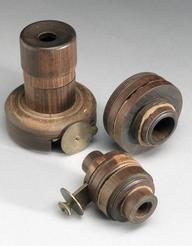







Terrestial globe 3" by Richard Cushee, London, 1731-1747
Dated to the mid-eighteenth century, this miniature celestial globe was made by Richard Cushee, a London globe maker. On its brass mounting the globe can be rotated and adjusted with respect to the small Moon and Sun orbs attached by curved arms. The celestial globe is a three-dimensional model of the heavens on which the stars are plotted on the outside of a sphere. Originating in the Ancient World it was probably inspired by the discovery that the Earth was round. The globe could be used to teach and demonstrate various astronomical principles. Until recently most celestial globes were ornate with decorative figures obscuring the stars.
Details
- Category:
- Astronomy
- Object Number:
- 1910-161
- Materials:
- stand, brass, silver and globe, paper, card, ivory
- Measurements:
-
overall: 200 x 160 mm
globe: 3 in.; 76.2 mm
- type:
- terrestrial globe
- credit:
- Mr S.G. Perceval.




